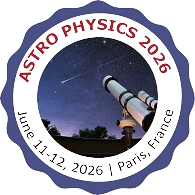Polarization in Astrophysics
Polarization in astrophysics refers to the alignment of light waves in specific directions as they travel through space. This phenomenon helps scientists probe the magnetic fields, dust, and gases in celestial objects. By studying polarized light from stars, galaxies, and cosmic dust, researchers can gain insights into the structure of magnetic fields, the nature of interstellar dust, and the formation of cosmic structures.
Related Conference of Polarization in Astrophysics
June 11-12, 2026
9th International Conference on Astronomy, Astrophysics and Space Science
Paris, France
August 27-28, 2026
17th International Conference on Exhibition on Lasers, Optics & Photonics
Zurich, Switzerland
August 27-28, 2026
11th International Conference on Quantum Physics and Mechanics
Zurich, Switzerland
Polarization in Astrophysics Conference Speakers
Recommended Sessions
- Astrochemistry
- Astroparticle Physics
- Astrophysical Magnetic Fields
- Astrophysical Plasmas
- Astrophysical Turbulence
- Astrophysics of Compact Objects
- Cosmology and the Early Universe
- Exoplanet Atmospheres
- Gravitational Wave Astronomy
- High-Energy Astrophysics
- High-Redshift Universe
- Instrumentation and Technology Development
- Observational Astronomy
- Planetary Science and Exploration
- Polarization in Astrophysics
- Quantum Astrophysics
- Radio Astronomy
- Relativistic Astrophysics
- Solar and Space Physics
- Solar System Dynamics
- Space Mission Operations and Management
- Space Telescopes and Missions
- Stellar Astrophysics
- Supernova Remnants
Related Journals
Are you interested in
- Acute Decompensated Heart Failure - Heart Failure conferences 2026 (UK)
- Acute Decompensated Heart Failure - Heart Failure conferences 2026 (UK)
- Advanced Heart Failure Management - Heart Failure conferences 2026 (UK)
- AI-Enhanced Cardiac Imaging for Heart Failure - Heart Failure conferences 2026 (UK)
- Algorithms in Quantum Computation - Quantum Mechanics 2026 (Switzerland)
- Applied Physics - Physics 2026 (France)
- Arrhythmias in Heart Failure - Heart Failure conferences 2026 (UK)
- Artificial Intelligence in Heart Failure Diagnosis - Heart Failure conferences 2026 (UK)
- Artificial Intelligence in Heart Failure Prognosis - Heart Failure conferences 2026 (UK)
- Astro-Particle Physics and Cosmology - Physics 2026 (France)
- Astrobiology and Life Beyond Earth - ASTRO PHYSICS 2026 (France)
- Astrophysics - Physics 2026 (France)
- Atomic, Molecular and Optical Physics - Physics 2026 (France)
- Biomarkers in Heart Failure - Heart Failure conferences 2026 (UK)
- Biophysics - Physics 2026 (France)
- Cardiac Resynchronization Therapy in Heart Failure - Heart Failure conferences 2026 (UK)
- Classical and Modern Physics - Physics 2026 (France)
- Condensed Matter Physics - Physics 2026 (France)
- Coronary Artery Disease and Heart Failure - Heart Failure conferences 2026 (UK)
- Cosmology and the Early Universe - ASTRO PHYSICS 2026 (France)
- Earth Observation and Remote Sensing - ASTRO PHYSICS 2026 (France)
- Electromagnetism and Electronics - Physics 2026 (France)
- Exercise and Cardiac Rehabilitation in Heart Failure - Heart Failure conferences 2026 (UK)
- Future Trends: Interstellar Travel and Space Colonization - ASTRO PHYSICS 2026 (France)
- Gravitational Waves and High-Energy Astrophysics - ASTRO PHYSICS 2026 (France)
- Heart Failure and Renal Dysfunction - Heart Failure conferences 2026 (UK)
- Heart Failure with Preserved Ejection Fraction - Heart Failure conferences 2026 (UK)
- Heart Failure with Preserved Ejection Fraction Challenges - Heart Failure conferences 2026 (UK)
- Heart Transplantation in Advanced Heart Failure - Heart Failure conferences 2026 (UK)
- Heavy-Ion Physics - Physics 2026 (France)
- High Energy Nuclear Physics - Physics 2026 (France)
- Interpretation of Quantum Mechanics - Quantum Mechanics 2026 (Switzerland)
- Lifestyle Interventions in Heart Failure - Heart Failure conferences 2026 (UK)
- Material Physics - Physics 2026 (France)
- Mechanical Circulatory Support in Advanced Heart Failure - Heart Failure conferences 2026 (UK)
- Medical Physics - Physics 2026 (France)
- Myocardial Remodeling and Fibrosis - Heart Failure conferences 2026 (UK)
- Nanotechnology - Physics 2026 (France)
- Neutron Scattering - Physics 2026 (France)
- Novel Pharmacological Therapies in Heart Failure - Heart Failure conferences 2026 (UK)
- Nuclear Engineering - Quantum Mechanics 2026 (Switzerland)
- Nuclear Fission and Fusion - Quantum Mechanics 2026 (Switzerland)
- Nuclear Physics - Quantum Mechanics 2026 (Switzerland)
- Nuclear Quantum Physics - Quantum Mechanics 2026 (Switzerland)
- Observational Astronomy and Telescope Technology - ASTRO PHYSICS 2026 (France)
- Particle Accelerators - Physics 2026 (France)
- Planetary Science and Exoplanets - ASTRO PHYSICS 2026 (France)
- Plasma Science - Physics 2026 (France)
- Pulmonary Hypertension in Heart Failure - Heart Failure conferences 2026 (UK)
- Quantum Chemistry - Quantum Mechanics 2026 (Switzerland)
- Quantum Chromodynamics (QCD) - Quantum Mechanics 2026 (Switzerland)
- Quantum Control and Measurement - Quantum Mechanics 2026 (Switzerland)
- Quantum Cryptography - Quantum Mechanics 2026 (Switzerland)
- Quantum Field Theories - Quantum Mechanics 2026 (Switzerland)
- Quantum Information & Quantum Computing - Quantum Mechanics 2026 (Switzerland)
- Quantum Mechanics - Quantum Mechanics 2026 (Switzerland)
- Quantum Nanoscience - Quantum Mechanics 2026 (Switzerland)
- Quantum Optics - Quantum Mechanics 2026 (Switzerland)
- Quantum Physics - Physics 2026 (France)
- Quantum Physics - Quantum Mechanics 2026 (Switzerland)
- Quantum Science and Technology - Physics 2026 (France)
- Quantum Science – Foundations and Frontiers - Quantum Mechanics 2026 (Switzerland)
- Quantum Technology - Quantum Mechanics 2026 (Switzerland)
- Quantum Thermodynamics - Quantum Mechanics 2026 (Switzerland)
- Quantum Transport - Quantum Mechanics 2026 (Switzerland)
- Radiation Protection - Physics 2026 (France)
- Renal Dysfunction and Cardiorenal Syndrome - Heart Failure conferences 2026 (UK)
- Solar Physics and Space Weather - ASTRO PHYSICS 2026 (France)
- Space Missions, Satellites, and Instrumentation - ASTRO PHYSICS 2026 (France)
- Space Technology, Robotics, and AI in Astronomy - ASTRO PHYSICS 2026 (France)
- Stellar and Galactic Astrophysics - ASTRO PHYSICS 2026 (France)
- Telemonitoring and Remote Care in Heart Failure - Heart Failure conferences 2026 (UK)
- Theoretical Astrophysics and Computational Modeling - ASTRO PHYSICS 2026 (France)
- Theory of Relativity - Physics 2026 (France)

